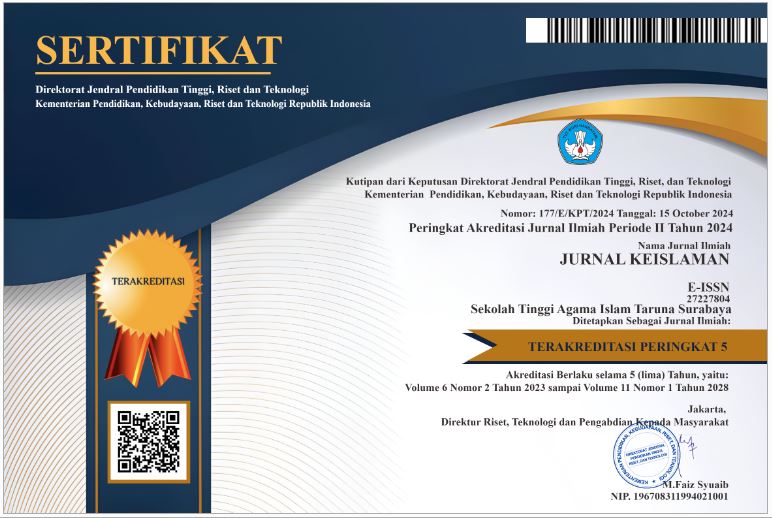Inovasi Pembelajaran Kitab Kuning Di Pesantren Dalam Penguatan Literasi Keagamaan
DOI:
https://doi.org/10.54298/jk.v7i1.236Keywords:
Learning innovation, Yellow Book, Madrasah AliyahAbstract
This research aims to analyze the forms of innovation in the teaching of Kitab Kuning in Islamic boarding schools (Pesantren) to strengthen religious literacy. The study employs a library research approach, utilizing literature sources such as journals, books, dictionaries, documents, magazines, and other references. The research method involves a literature review. The results indicate that Pesantren is capable of producing students proficient in Arabic language and fundamental knowledge of religious studies. Various innovations can be implemented to enhance religious literacy, such as the use of technology through e-learning and online forums. Additionally, innovations in teaching models or methods, such as the ArRumuz method, which facilitates quick reading of religious texts, and problem-based learning methods, involving the study of issues in society, can contribute to strengthening religious literacy. Moreover, innovations in extracurricular activities, including programs like Qira’atul Kutub tutoring, Qira’atul Kutub study sessions, and achievement award and art performance programs, are also noteworthy.
Downloads
References
A. Steenbrink, Karel. (1994). Pesanten Madrasa Sekolah, Jakarta: Pustaka LP3ES Indonesia.
Aliyah Aliyah. (2018), Pesantren tradisional sebagai basis pembelajaran nahwu dan sharaf dengan menggunakan kitab kuning, Al-Ta’rib: Jurnal Ilmiah Program Studi Pendidikan Bahasa Arab IAIN Palangka Raya, Vol. 6, No. 1. Hal. 78.
Al-Rasyidin. (2017). “Pembelajaran Kitab Kuning di Pesantren Mustafawiyah, Mandailing Natal”. Journal of Contemporary Islam And Muslim Societies, UIN SU Press. Vol. 1 NO. 1 JANUARI-JUNI.
Amirudin, N. (2022). Literasi Digital Dalam Membentuk Karakter Religius Generasi Milenial (Studi tentang Pembentukan Karakter Mahasiswa PAI Universitas Muhammadiyah Gresik. Jurnal Pendidikan Islam, 8(1), 87-100.
As’ad Aliy. (2007). Ta’limul al-Muta’allim Bimbingan Bagi Penuntut Ilmu Pengetahuan. Kudus: Menara Kudus
Azra, Azyumardi. (1992). The Origins of Islamic Reformism in Southeast Asia: Networks of Malay-Indonesian and Middle Eastern 'Ulama' in the Seventeenth and Eighteenth Centuries. Honolulu: University of Hawaii Press.
Damanhuri. (2017). Kitab kuning: Warisan keilmuan ulama dan kontekstualisasi hukum islam nusantara. ‘Anil Islam Jurnal Instika, 10 No. 02, 234–261.
Diyan, Yusr. (2019). Pesantren dan Kitab Kuning, Jurnal Ikhtibar, Vol. 06, No. 2.
Geertz, Clifford. (1960). The Religion of Java. Chicago: The University of Chicago Press.
Huda, S., & Adiyono, A. (2023). Inovasi Pemgembangan Kurikulum Pendidikan Pesantren Di Era Digital. ENTINAS: Jurnal Pendidikan dan Teknologi Pembelajaran, 1(2), 371-387.
Natsir Mb, Jung Muhammad Nur. (2020). Efektivitas Pengajian Kitab Kuning Terhadap Pemikiran Hukum Bagi Santri Di Pondok Pesantren Nahdlatul Ulum Soreang Maros (Analisis Perbandingan Pemikiran Imam Maliki Dan Imam Syafi’i) (Makassar, Uin Alauddin)
Martin Van Bruinessen, (2015). Kitab Kuning, Pesantren dan Tarekat. Yogyakarta: Gading Publising.
Mendez, E., Wohlin, C., Felizardo, K., Kalinowski, M. (2020). Guidelines for the search strategy to update systematic literature reviews in software engineering. Information and Software Technology,7-24. DOI:https://doi.org/10.1016/j.infsof.2020.106366
Wahid, Muhammad Irfan. (2020), Dari Tradisional menuju digital: adopsi internet oleh nahdlatul ulama selama pandemi covid-19, Jurnal Studi Agama dan Masyarakat, Vol. 16. No. 1, 73–84.
Muqoyyidin dan Andik Wahyun. (2014). Kitab kuning dan tradisi riset pesantren di nusantara.” Ibda`: Jurnal Kajian Islam Dan Budaya. Vol.12, no. 2.
Purwadhi Purwadhi. (2019). “Pengembangan kurikulum dalam pembelajaran abad XXI,” Mimbar Pendidikan. Vol.4, no. 2. Hal.103–112.
Salam, R. (2021). Pendidikan di Pesantren dan Madrasah. IQRA: JURNAL MAGISTER PENDIDIKAN ISLAM, 1(1), 01-09.Woodward, Mark R. (1989). Islam in Java: Normative Piety and Mysticism in the Sultanate of Yogyakarta. Tucson: The University of Arizona Press.
Sanusi, Uci. (2013). Transfer ilmu di pesantren: Kajian Mengenai Sanad Ilmu. Jurnal Pendidikan Islam – Ta’lim. Vol. 11, No. 1, hlm. 6170.
Siswanto. (2006). Praksis model studi islam dalam komunitas pesantren (menuju humanisasi kitab kuning) dalam Jurnal KARSA, Jurnal Sosial dan Budaya Keislaman. Edisi Vol. X, No. 2, hlm. 920.
Snyder, H. (2019). Literature review as a research methodology: An overview and guidelines. Journal of Business Research, 104, 333-339. https://doi.org/10.1016/j.jbusres.2019.07.039
Sukmadinata. (2006). Pengendalian mutu pendidikan sekolah menengah: Konsep, prinsip dan instrumen. Bandung: Refika Aditama. Hal. 38.
Syafii, M. Ilyas. (2017). Pendidikan Islam di Pesantren. Jakarta: Rajawali Press.
Syahid, N. (2019). Urgensi Kitab Ta’limul Muta’allim pada Pembelajaran Modern. QUDWATUNA, 2(2), 126-142.
Yani, Y. I., Wahyudi, H., & Tarigan, M. R. I. M. A. (2020). Pembagian Ilmu Menurut Al-Ghazali (Tela’ah Buku Ihya’‘Ulum ad-Din). Al-Fikra: Jurnal Ilmiah Keislaman, 19(2).
Yusuf, Syaifulloh., & Imawan, Dzulkifli Hadi. (2020). Kitab kuning dan pembentukan karakter religious muslim Indonesia. ISLAMIKA INSIDE: Jurnal Keislaman dan Humaniora Volume 6, Nomor 1.
Downloads
Published
How to Cite
Issue
Section
License
Copyright (c) 2024 Ronna Sari Daulay, Meldyana Priadina Siregar, Hadi Saputra Panggabean

This work is licensed under a Creative Commons Attribution-ShareAlike 4.0 International License.
Authors who publish with this journal agree to the following terms:
- Authors retain copyright and grant the journal right of first publication with the work simultaneously licensed under a Creative Commons Attribution-ShareAlike 4.0 that allows others to share the work with an acknowledgement of the work's authorship and initial publication in this journal.
- Authors are able to enter into separate, additional contractual arrangements for the non-exclusive distribution of the journal's published version of the work (e.g., post it to an institutional repository or publish it in a book), with an acknowledgement of its initial publication in this journal.
- Authors are permitted and encouraged to post their work online (e.g., in institutional repositories or on their website) prior to and during the submission process, as it can lead to productive exchanges, as well as earlier and greater citation of published work (See The Effect of Open Access).


















